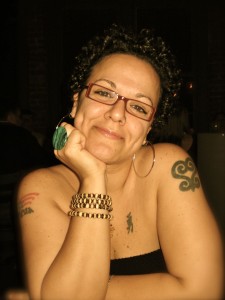She Called Me a Poet
By Candy Taaffe
August 9, 2009
Finally official.
[1] Conscientizacao (consciousness-raising) as defined by Paulo Freire (2000) involves identifying contradictions in experience through dialogue and becoming a subject with other oppressed subjects-that is, becoming part of the process of changing the world.
_______________________________________________
 Claudine Candy Taaffe is a doctoral student at the University of Illinois @ Urbana-Champaign in the Department of Education Policy, Organization and Leadership. She began graduate school after eleven years of working in the fields of middle school education, community and youth organizing, and community-based nonprofit programs serving young people. Her research interests include visual methodology, Black girlhood studies, youth development, women of color feminisms, race and ethnic studies, and educational practice. Her dissertation is a two-year long visual ethnographic account of middle school-aged Black girls, who creatively use photography to construct counter-narratives to the negative stereotypes about Black girls in schools and popular culture.
Claudine Candy Taaffe is a doctoral student at the University of Illinois @ Urbana-Champaign in the Department of Education Policy, Organization and Leadership. She began graduate school after eleven years of working in the fields of middle school education, community and youth organizing, and community-based nonprofit programs serving young people. Her research interests include visual methodology, Black girlhood studies, youth development, women of color feminisms, race and ethnic studies, and educational practice. Her dissertation is a two-year long visual ethnographic account of middle school-aged Black girls, who creatively use photography to construct counter-narratives to the negative stereotypes about Black girls in schools and popular culture.




0 comments